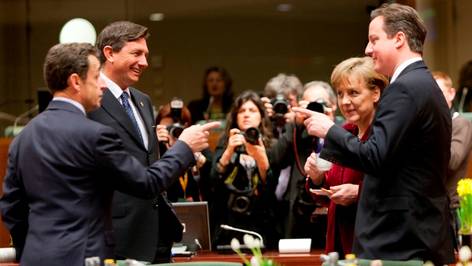NEWS
Prime Minister Pahor attends European Council Meeting in Brussels
The Prime Minister of the Republic of Slovenia, Borut Pahor, attended the European Council meeting of 24/25 March in Brussels, where the Heads of State and government of the EU Member States discussed the economic policy and the situation in the Southern Mediterranean. Mr Pahor opened the press conference by highlighting the agreement reached by EU leaders on the European Stability Mechanism, within which Slovenia had negotiated a more favourable ratio of burden sharing than has been the case with the current provisional mechanism from which Ireland is provided financial assistance. "Instead of a 0.47 % share, Slovenia's contribution to the permanent mechanism calculated according to the ratio of its share in the ECB capital will be 0.428 %".
Slovenia has taken major efforts for the purpose of slightly lessening the burden on new and less developed members of the euro area. Moreover, it supported the German proposal under which 80 billion EUR should be paid in five equal annual instalments. Among the members of the euro area, Slovenia's contribution, the same as with the provisional mechanism, is otherwise among the highest considering the share of GDP, as the ratio system also takes into account the level of public debt. In Mr Pahor's view this proves that the situation in Slovenia is better than most people think and that in tackling the crisis, the country is performing much better than shown by the prevailing public opinion. "The EU political circles do appreciate the proportionate contribution of Slovenia, a relatively small and young country, intended to help more established European economies," said Prime Minister Pahor.
Elaborating on the situation in the Southern Mediterranean, particularly in the light of the Libyan crisis, Mr Pahor emphasised that "Slovenia does not intend to send its troops on Libyan soil or any other national territory in this area." In this context he nevertheless said that within its capabilities, Slovenia is willing to cooperate in helping some 300,000 refugees currently staying at EU borders. Mr Pahor added that during his informal bilateral talks with state leaders whose countries are actively involved in military operations for providing security in the air space over Libya, he emphasised that UNSCR 1973 explicitly prohibits the deployment of ground forces and that this ban should be observed.
At the Council meeting, the EU Heads of State and government also discussed the issue of nuclear energy. The majority of leaders of the EU countries where nuclear energy is exploited or is planned to be exploited agree that while observing the highest standards of nuclear safety, nuclear energy can further be used in the energy mix. Prime Minister Pahor said that Slovenia absolutely agrees with this view. In this context he announced that as early as next week, Slovenia would transpose the directive on nuclear plant security into its legal order. He reiterated the Government's intention to include the project of the construction of the second reactor of the Krško Nuclear Power Plant into the proposal of the national energy programme. In this respect Mr Pahor said that "one must be aware of the potential hazards of nuclear energy for the population; therefore, the security of people must come first." In the light of the Japanese nuclear crisis the EU leaders supported the conclusion that all EU nuclear plants should be reviewed on the basis of a comprehensive and transparent risk and safety assessment ("stress tests"), while inviting the Commission and the European Nuclear Safety Regulatory Group to develop as soon as possible the scope and modalities of these tests with the full involvement of the Member States.




